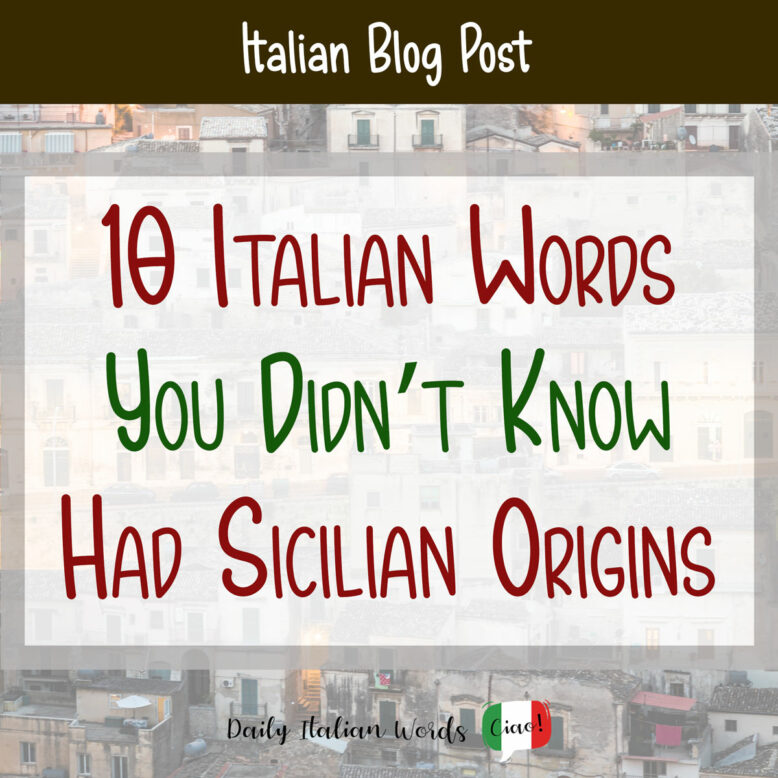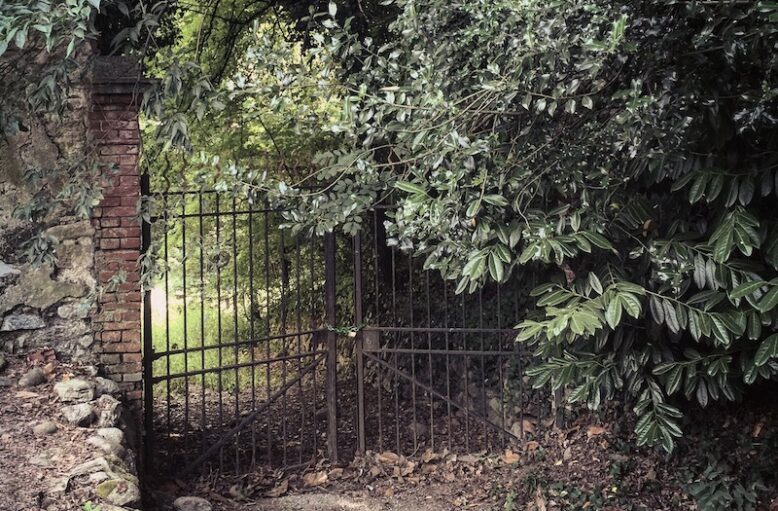Sicilian is an Italian regional dialect that has a long history. It is renowned for being one of the first languages in the Peninsula to be used for literary purposes. The Sicilian Vernacular had its heyday during the XIII century when it achieved great success.
The success of Sicilian poetry was so widespread that Tuscan literates began to export and recopy those poems in Tuscan Vernacular. Over time, Sicilian developed independently, enriching the Italian vocabulary with new words. Many of these words, with their Sicilian origins, remain unknown to most Italians even today.
Let’s explore ten Italian words that, like many Italians, you probably didn’t know had Sicilian origins. We’ll also discover their meanings in today’s standard Italian.

Coppola
The word “coppola” is believed to have originated from the Sicilian term “còppula.” In English, it refers to a flat cap, similar to the ones worn by the characters in the TV series Peaky Blinders. This type of cap was widespread in Southern Italy, and as depicted in the TV series, individuals associated with the mafia were often recognised by their hats.

Trazzera
This term is not commonly used in Italian, but it has acquired a specific connotation to refer to the type of unpaved roads typical of Sicily. Specifically, these are country paths that are wide enough to allow a car to pass through. To visualise it, imagine a dirt road with patches of grass growing at the edges and in the middle, where the wheels do not compress the ground.
Rastrello
While in Italian, this word is commonly used to refer to a “rake”, its meaning has taken on another connotation due to Sicilian influence. In literary masterpieces such as those of Giovanni Verga, it is used to signify a gate or a small gate, which in standard Italian would generally be referred to as “cancello.”

Abbuffarsi
The word “abbuffarsi” means to eat until you explode, consuming any kind of food with greed. The term “abbuffarsi” is likely derived from “buffa,” which is the word for “toad” in Sicilian. The word evokes the image of a toad swelling up, similar to how one’s cheeks might become completely full when eating a lot. Today, this term is used throughout the entire Peninsula, but it is more common in Central and Southern Italy.
Arancini / Arancine
In this case, there’s nothing to translate. Arancini are Sicilian typical rice balls that are now sold throughout the entire Peninsula (although the best ones can be found only in Sicily, and nobody can argue otherwise). This delicious street food, however, is in an eternal rivalry between the two main cities of the island, Palermo vs. Catania, each claiming to be its place of origin.
On the one hand, in Palermo, they are called arancine, derived from “arancia” (orange), as they resemble small oranges in shape. And that’s not all. In the main city, they prepare a ragù with meat, which is then placed inside a shell of white rice. In the center, there’s a heart of mozzarella, and the outer side is coated in breadcrumbs, eggs, and flour to create a sturdy layer for frying.
On the other side, in Catania, they call this food arancini, and they mix all the ingredients together, rather than separating each layer like in Palermo. This natural rivalry is deeply rooted in tradition. For those of us who taste them, they are just so tasty and delicious that it’s hard to resist either version.

Intrallazzo
From here on, we start to move towards the darker side of the island, for which it is renowned worldwide. This word is generally associated with cheating, originally connected to businesses involving scams, fraud, or deception. Nowadays, it has different connotations, such as referring to a story that is complicated, lengthy, and very cumbersome to understand.
Mafia
This is one of the most well-known Italian words on the planet. But what is it? Today, we know it as a complex of criminal organisations, mainly originating in Sicily during the 19th century, spreading on a territorial basis, governed by the law of silence (omertà), and organised hierarchically. This is a social and systemic problem that still affects the country in the present day.

Pizzino
This is a message, a piece of paper with some words on it, used to communicate among mafia members. This was, and still is, the way to bypass wiretapping. The most important figures of these groups entrust others, faithful and loyal companions, with the task of delivering their messages. It is important to understand that this happens because the “boss mafiosi” are at large, and cannot be seen around, otherwise it would be easier for the police to apprehend them.
Cosca
Let’s delve deeper into this by understanding the word “cosca.” Probably, the English word that best represents it is “gang.” It is related to clans, families involved in these kinds of businesses and criminal organizations. Not only in Sicily but also ‘Ndrangheta in Calabria and Camorra in Naples. Groups tied by a blood bond.

Picciotto
Originally, this term was used to indicate all those people who formed the Sicilian gangs that helped Giuseppe Garibaldi drive away the Bourbon family from the Two-Sicilies Reign. It was in 1860 when this happened, and after a few years, Italy became one unified country. After the Unification of Italy in 1864, the word started to develop differently, and today it is used to indicate a member of a criminal organisation of a lower rank.
Conclusion
Sicilian words have significantly contributed to the standard Italian language. This list includes ten terms that have become widely used, albeit not always for positive reasons. However, it’s important to acknowledge that the influence of regional dialects extends beyond Sicily, impacting the Italian language as a whole. This influence has enriched Italian vocabulary, creating a diverse and captivating linguistic history.
About the author: Fabio Guarino
As a Linguist and Language Specialist, working as a Freelance Content Writer and SEO Marketer allows me to combine my passions and interests with my career. My favourite thing about working with languages is playing with words. And this is something I’ve always dreamed about since I started to wander the globe and study languages.

Fabio Guarino is a Linguist and Language Specialist who operates as a Freelance Content Writer and SEO Marketer. He considers himself fortunate to be able to blend his passion for his native language, Italian, along with English and Spanish, with his career.



